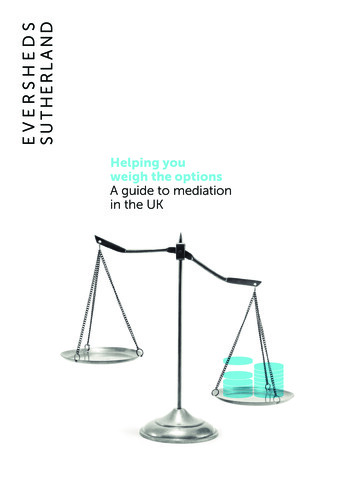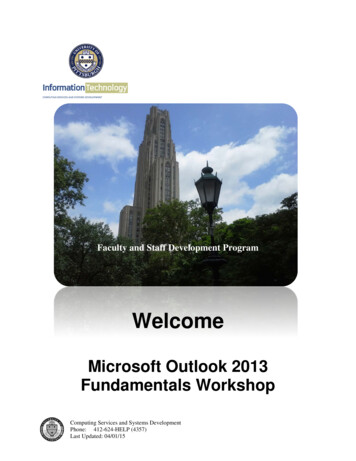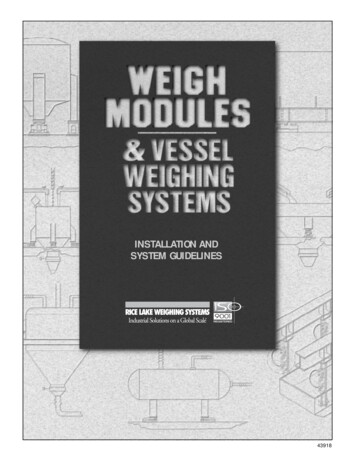
Transcription
Helping youweigh the optionsA guide to mediationin the UK
Helping you weigh the optionsA guide to mediation in the UKWhat is mediation?Mediation is a confidential process ofnegotiation, facilitated by an independentand impartial third person: a mediator.Unlike a judge or arbitrator, a mediatordoes not make a decision, but assists theparties to reach a solution themselves.Mediation can be used to resolve almostany kind of dispute, including thoseinvolving numerous parties.2
Helping you weigh the optionsA guide to mediation in the UKWhy mediate?Achieve the solution that’s right for youMaintain confidentialityMediation allows the parties to retain control over theoutcome of a dispute. It lets parties be creative in theirproblem solving, and to devise solutions which a court wouldnot apply. Settlements achieved in mediation can addresspersonal, commercial and other important interests, whichmay not be possible if a court determined the outcome. Forexample, mediated settlements can include publicstatements or apologies, structured payment terms,restructuring of existing contracts and on-going cooperation.While court actions are matters of public record, whattranspires at mediation is confidential. The entire process is“without prejudice.” Whether mediation occurs before or aftercourt action is started, what is said in mediation, and thedocuments produced for a mediation, cannot be disclosed inlater proceedings if the matter does not settle at mediation.Even if the solution reached is not ideal, it will be one you canlive with. In court, the decision may go against you, or worse,the judge may reach a decision that is unsatisfactory to bothparties.Mediated settlements tend to hold up over time as the partiesthemselves have created them. In addition, if a later disputearises, the parties are more likely to use alternative disputeresolution, an informal process, to resolve their differences. ettlement terms can remain confidential and mediationSavoids a damaging or embarrassing court precedent being set.Preserve important relationshipsMediation can address all parties’ interests and can preserve aworking relationship between them. Mediation can also makethe termination of a relationship more amicable.Gain an understanding of the other side’s viewsHigh levels of success/satisfactionParties can gain a thorough understanding of the otherparties’ points of view, and have an enhanced opportunity tobe heard and understood during the process. Mediationallows misconceptions to be eliminated.Parties are generally very satisfied with the mediation process.There is also a high rate of success in mediation althoughthe statistics vary, the range indicates that 65%-85% of casessettle at the mediation session.The presence of decision makers on each side allows the keyindividuals to focus on what needs to be addressed if thedispute is to be resolved.Rapid resolution keeps costs downSince over 90% of court cases are settled before trial much ofthe time, energy and money spent preparing to bring ordefend court proceedings could be saved. As mediation canlead to rapid settlement, it can reduce the time, cost andstress that would otherwise be involved in pursuing a matterto trial.Mediation is possible at any stage in a dispute. It can be usedbefore a dispute escalates in an attempt to avoid courtproceedings. Once court proceedings are underway,mediation remains a possibility at any stage in the run-upto trial.3
Helping you weigh the optionsA guide to mediation in the UKWhat are thepotential downsides?The parties (and their legal advisers) do need time toprepare for and arrange a mediation, and if settlement isnot achieved at mediation, it may feel as though the wholeexercise has been a waste of time and money, and has onlyserved to further draw out the litigation process.Some parties, particularly defendants, may sometimessuggest mediation as an attempt to draw out the process(and delay having judgment entered against them) withoutgenuinely trying to achieve settlement.However, mediation is rarely a waste of time and money.Success rates are high, and even a failed mediation canassist to narrow the issues and to increase the likelihoodthat the case will settle without the need for trial. A failedmediation can identify the obstacles to settlement, andalso generate options and opportunities, which can bediscussed after the mediation session. In practice, a largeof proportion of cases that do not settle at the mediationsession will settle shortly afterwards. Even if settlementis not reached, you will have gained a useful insight intoyour opponent’s position and perspective, and a betterunderstanding of the focus of your opponent’s case.It does not give certainty on legal issues, for example, “is myexclusion of liability clause enforceable?.”44
Helping you weigh the optionsA guide to mediation in the UKThe mediatorAttendeesThe parties can agree on the appointment of themediator. If they cannot agree, a third party (such asa mediation service provider) can be asked to select asuitable mediator.The parties will need to identify the representative orrepresentatives to attend the mediation on their behalf. Itis helpful to have representatives with requisite knowledgeto deal with all issues which may arise in the mediation.One of the representatives for each party must haveauthority to settle the dispute at the mediation or havethe ability to consult on the day as necessary the decisionmaker e.g. the board of directors.The parties are free to select a person with a relevantlegal or technical background, depending on thenature of the dispute. It is also common in England fora mediator to work with an assistant or pupil mediator.The parties do not normally pay for that additionalperson, but can take advantage of the skills of thatadditional person, by ensuring that the assistant hasspecialist expertise relevant to the dispute (for example,accounting expertise).MediationagreementThe parties usually enter into an Agreement to Mediate.The agreement will deal with:— organisational and procedural mattersPreparation forthe mediationIt is the usual practice for the parties to exchange andprovide the mediator with a written case summary beforethe mediation commences.This document usually provides a chronology of eventsand an outline of the issues involved. It also usuallyidentifies the issues which the parties have agreed, andsets out each party’s main arguments on issues in disputeand also each party’s aims in the mediation. This is oftenaccompanied by a bundle of supporting documents.— confidentiality and privilege of information— the extent of disclosure of information and thetimetable for exchange of information— how the mediation is terminated or concluded— responsibility for costs and the mediators fees5
Helping you weigh the optionsA guide to mediation in the UKWhat to expecton the dayBe prepared to set aside a full day for the mediation.Complex multi-party disputes may require more time.The mediator will normally open the mediation with a jointsession attended by all parties and their lawyers. Each partywill have an opportunity to express their view of theproblem to the group. There is no formal structure andmuch depends on the wishes of the parties, but themediator may encourage the representatives of the partiesto say a few words themselves, rather than simply relyingon their lawyers to express their views.The parties will usually then move to their own individualrooms and the mediator will shuttle between them. Privatesessions with the mediator allow the parties to be frank andto have a realistic look at their case in private, assessing thestrengths and weaknesses, and to consider variousalternatives. You are not committed to anything until youagree to a resolution and sign a settlement agreement sotry to maintain an open mind and freely discuss allpossibilities. The mediator will not share anything discussedwith him in private with the other side, unless expresslyauthorised to do so.The mediator is not an adviser to any of the parties. It is notthe mediator's role to tell the parties what their rights are orhow they should resolve the dispute. The mediator remainsimpartial throughout the process. Nor is the mediator ajudge. There is no point trying to convince him you areright, it is the other side you need to convince.No party needs to give ground if it does not wish to do so,and a party may leave the mediation at any time. The objectof a mediation is to find a mutually acceptable solution.However, be flexible - there may not be a perfect solution,or if there is, you may not achieve it in court.Who pays the costsof the mediation?This is a matter for agreement between the partiesbut in general:— the parties will share the mediator’s fees, expenses (forexample travel) and other costs of the mediation (forexample the venue, food, refreshments etc)— the parties will pay their own legal costs (preparation for,participation in and representation at, the mediation)In some cases, one party will agree to pay the entiremediator’s fees and expenses, as a way of encouraginganother party to mediate.However, if the dispute is not settled and progresses to trial,the court is likely to order that the losing party pays thewinner’s legal costs, which may include those incurredpreparing for and attending mediation.6
Helping you weigh the optionsA guide to mediation in the UKMediationmyths exposedLawyers and clients can negotiate direct mediation is unnecessaryVarious barriers to effective communication exist when negotiations aredirect (between lawyers or between the parties). The assistance of aneutral third party can help overcome these barriers, by managing theprocess, opening communications, instilling a problem-solving approach,encouraging brainstorming of options and overcoming deadlock.In addition, parties tend to be unwilling to disclose confidentialinformation about their view of the case to an opposing party duringdirect negotiations. They may also be reluctant to disclose their thinkingon settlement proposals or any concerns they may have about thedispute or a settlement of the matter. The mediation can bridge thesegaps by allowing private and confidential discussions between themediator and each party and, in turn, managing each party’s expectationsabout the process, the negotiations and the likely outcome.The mediator is just a messengerA mediator’s task is considerably more sophisticated it includescoaching, developing strategies and reality testing. The mediator is anactive participant. The mediator uses a range of methods and techniquesthat engage people in the process and that encourage them to considervarious settlement options. The techniques range from skilfulquestioning, acknowledging, summarising and reframing to coaching theparties on negotiation styles and techniques.Offering to mediate is a sign of weaknessThere is nothing to lose by offering to mediate even if you believe youhave a strong case. Mediation may help you to obtain your desiredoutcome at a far earlier stage, saving time and costs, and may help you tohold on to valuable relationships. The courts also encourage the use ofmediation, and can order a party who has failed to consider mediation topay some of the other side’s costs, even if that party has won at trial.7
More informationFor more information please contact:Helen EastwoodJoint Head of Professional SupportT: 44 121 232 1435M: 44 788 765 8416heleneastwood@eversheds-sutherland.comHannah NicholsJoint Head of Professional SupportT: 44 115 931 7614M: 44 770 204 s-sutherland.com Eversheds Sutherland 2019. All rights reserved.Eversheds Sutherland (International) LLP is part of a global legal practice,operating through various separate and distinct legal entities, underEversheds Sutherland. For a full description of the structure and a list ofoffices, please visit www.eversheds-sutherland.com.DTUK002702 07/19
Helping you weigh the options A guide to mediation in the UK 5. What to expect on the day Be prepared to set aside a full day for the mediation. Complex multi-party disputes may require more time. T










